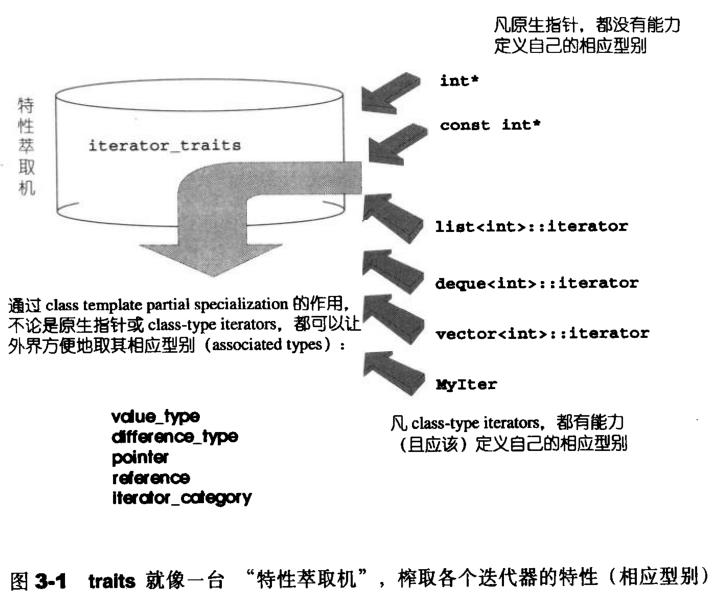STL迭代器(iterator)
Posted wanglelelihuanhuan
tags:
篇首语:本文由小常识网(cha138.com)小编为大家整理,主要介绍了STL迭代器(iterator)相关的知识,希望对你有一定的参考价值。
迭代器定义
迭代器(iterator):扮演容器与算法之间的胶合剂,是所谓的“泛型指针”。共有5种类型
迭代器模式:提供一种方法,使之能够依序寻访某个聚合物(容器)所含的各个元素,而又无需暴露该聚合物的内部表达方式。
STL的中心思想在于:将数据容器和算法分开,彼此独立设计,最后再以一贴胶着剂(iterator)将它们撮合在一起。
STL的迭代器是一个可遍历STL容器全部或者部分数据。
迭代器原理
迭代器是一种行为类似智能指针的对象,而指针最常见的行为就是内容提领和成员访问。因此迭代器最重要的行为就是对operator*和operator->进行重载。
迭代器的应用
#include <iostream>
#include <vector>
#include <list>
#include <algorithm>
#include <string>
using namespace std;
void Test1()
vector<int > v1;
v1.push_back(5);
v1.push_back(4);
v1.push_back(3);
v1.push_back(2);
v1.push_back(1);
// 迭代器遍历顺序表
vector<int >::iterator it = v1.begin();
for (; it != v1.end(); ++it)
cout << *it << " ";
cout << endl;
// STL的排序算法
sort(v1.begin(), v1.end());
it = v1.begin();
for (; it != v1.end(); ++it)
cout << *it << " ";
cout << endl;
void Test2()
list<string > l1;
l1.push_back("xjh");
l1.push_back("zpw");
l1.push_back("yb");
l1.push_back("whb");
// 迭代器遍历链表
list<string >::iterator it = l1.begin();
for (; it != l1.end(); ++it)
cout << *it << " ";
cout << endl;
// STL的替换算法
replace(l1.begin(), l1.end(), "xjh", "lcf");
it = l1.begin();
for (; it != l1.end(); ++it)
cout << *it << " ";
cout << endl;
void Test3()
list<string > l1;
l1.push_back("xjh");
l1.push_back("zpw");
l1.push_back("yb");
l1.push_back("whb");
// 迭代器遍历链表
list<string >::iterator it = l1.begin();
for (; it != l1.end(); ++it)
cout << *it << " ";
cout << endl;
// STL的find 算法查找迭代器区间的数据,并返回找到节点的迭代器
it = find(l1.begin(), l1.end(), "yb");
if (it != l1.end())
cout << "find success:" << *it << endl;
// 通过迭代器修改节点数据
*it = "yls";
it = find(l1.begin(), l1.end(), "yb");
if (it == l1.end())
cout << "find failed" << endl;
迭代器失效
由删除导致,指向当前节点的迭代器被删除
解决办法:1、保存当前位置,指向下一个迭代器。2、用一个接收erase的返回值。
#include<iostream>
using namespace std;
#include<vector>
#include<list>
void PrintVector(vector<int>& v)
vector<int>::iterator it = v.begin();
while (it != v.end())
cout << *it << " ";
++it;
cout << endl;
void PrintList(list<int>& l)
list<int>::iterator it = l.begin();
while (it != l.end())
cout << *it << " ";
++it;
cout << endl;
void TestVector()
vector<int> v;
v.push_back(1);
v.push_back(2);
v.push_back(3);
v.push_back(4);
PrintVector(v);
vector<int>::iterator it = v.begin();
while (it != v.end())
//迭代器失效
vector<int>::iterator tmp = it;
++it;
if ((*tmp) % 2 == 0)
v.erase(tmp);
(*it)++;
cout << *it << " ";
++it;
cout << endl;
void TestList()
list<int> l;
l.push_back(1);
l.push_back(2);
l.push_back(3);
l.push_back(4);
PrintList(l);
list<int>::iterator it = l.begin();
while (it != l.end())
//迭代器失效
/*list<int>::iterator tmp = it;
++it;
if ((*tmp) % 2 == 0)
l.erase(tmp);
*/
//迭代器失效
if ((*it) % 2 == 0)
it=l.erase(it);
else
++it;
(*it)++;
cout << *it << " ";
++it;
cout << endl;


#pragma once
//迭代器型别
struct InputIteratorTag
;
struct OutputIteratorTag
;
struct ForwordIteratorTag : public InputIteratorTag
;
struct BidirectionalIteratorTag : public ForwordIteratorTag
;
struct RandomAccessIteratorTag : public BidirectionalIteratorTag
;
template <class T, class Distance>
struct InputIterator
typedef InputIteratorTag IteratorCategory;
typedef T ValueType;
typedef Distance DifferenceType;
typedef T* Pointer;
typedef T& Reference;
;
struct OutputIterator
typedef OutputIteratorTag IteratorCategory;
typedef void ValueType;
typedef void DifferenceType;
typedef void Pointer;
typedef void Reference;
;
template <class T, class Distance> struct ForwardIterator
typedef ForwordIteratorTag IteratorCategory;
typedef T ValueType;
typedef Distance DifferenceType;
typedef T* Pointer;
typedef T& Reference;
;
template <class T, class Distance> struct BidirectionalIterator
typedef BidirectionalIteratorTag IteratorCategory;
typedef T ValueType;
typedef Distance DifferenceType;
typedef T* Pointer;
typedef T& Reference;
;
template <class T, class Distance> struct RandomAccessIterator
typedef RandomAccessIteratorTag IteratorCategory;
typedef T ValueType;
typedef Distance DifferenceType;
typedef T* Pointer;
typedef T& Reference;
;
//
// 迭代器内嵌包含的种相应的型别
// IteratorCategory 、ValueType、 DifferenceType、Pointer、 Reference
// 这种内嵌的型别定义,确保了能够更方便的跟 STL融合。
// 且方便IteratorTraits的类型萃取
//
template <class Category, class T, class Distance = ptrdiff_t,
class Pointer = T*, class Reference = T&>
struct Iterator
typedef Category IteratorCategory;// 迭代器类型
typedef T ValueType;// 迭代器所指对象类型
typedef Distance DifferenceType;// 两个迭代器之间的距离
typedef Pointer Pointer;// 迭代器所指对象类型的指针
typedef Reference Reference;// 迭代器所指对象类型的引用
;
//Traits 就像一台 “ 特性萃取机 ” ,榨取各个迭代器的特性(对应的型别)
template <class Iterator>
struct IteratorTraits
typedef typename Iterator::IteratorCategory IteratorCategory;
typedef typename Iterator::ValueType ValueType;
typedef typename Iterator::DifferenceType DifferenceType;
typedef typename Iterator::Pointer Pointer;
typedef typename Iterator::Reference Reference;
;
/// 偏特化原生指针类型
template <class T>
struct IteratorTraits<T*>
typedef RandomAccessIteratorTag IteratorCategory;
typedef T ValueType;
typedef ptrdiff_t DifferenceType;
typedef T* Pointer;
typedef T& Reference;
;
/// 偏特化const原生指针类型
template <class T>
struct IteratorTraits<const T*>
typedef RandomAccessIteratorTag IteratorCategory;
typedef T ValueType;
typedef ptrdiff_t DifferenceType;
typedef const T* Pointer;
typedef const T& Reference;
;
//Distance的实现
template <class InputIterator>
inline typename IteratorTraits<InputIterator>::DifferenceType
__Distance(InputIterator first, InputIterator last,InputIteratorTag)
IteratorTraits<InputIterator>::DifferenceType n = 0;
while (first != last)
++first;
++n;
template <class RandomAccessIterator>
inline typename IteratorTraits<RandomAccessIterator>::DifferenceType
__Distance(RandomAccessIterator first, RandomAccessIterator last, RandomAccessIteratorTag)
return last - first;
template <class InputIterator>
inline typename IteratorTraits<InputIterator>::DifferenceType
Distance(InputIterator first, InputIterator last)
return __Distance(first, last, IteratorTraits<InputIterator>::IteratorCategory());
//Advance的实现
template <class InputIterator, class Distance>
inline void __advance(InputIterator& i, Distance n, InputIteratorTag)
while (n--)
++i;
template <class BidirectionalIterator, class Distance>
inline void __Advance(BidirectionalIterator & i, Distance n,BidirectionalIteratorTag)
if (n >= 0)
while (n--) ++i;
else
while (n++) --i;
template <class RandomAccessIterator, class Distance>
inline void __Advance(RandomAccessIterator & i, Distance n,RandomAccessIteratorTag)
i += n;
template <class InputIterator, class Distance>
inline void Advance(InputIterator & i, Distance n)
__Advance(i, n, IteratorTraits <InputIterator>::IteratorCategory());
template <class T, class Distance>
inline T* ValueType(const InputIterator<T, Distance>&)
return (T*)(0);
/
template <class T, class Distance>
inline T* ValueType(const ForwardIterator<T, Distance>&)
return (T*)(0);
template <class T, class Distance>
inline T* ValueType(const BidirectionalIterator<T, Distance>&)
return (T*)(0);
template <class T, class Distance>
inline T* ValueType(const RandomAccessIterator<T, Distance>&)
return (T*)(0);
template <class T>
inline T* ValueType(const T*) return (T*)(0);
//
// 逆置迭代器的定义,反向迭代器是正向迭代一层封装
template <class Iterator>
class ReverseIterator
public:
// 通过迭代器萃取器,萃取出正向迭代器中定义的基本类型
typedef typename IteratorTraits<Iterator>::IteratorCategory IteratorCategory;
typedef typename IteratorTraits<Iterator>::ValueType ValueType;
typedef typename IteratorTraits<Iterator>::DifferenceType DifferenceType;
typedef typename IteratorTraits<Iterator>::Pointer Pointer;
typedef typename IteratorTraits<Iterator>::Reference Reference;
typedef Iterator IteratorType;
typedef ReverseIterator<Iterator> Self;
public:
ReverseIterator()
explicit ReverseIterator(IteratorType x)
: _current(x)
Reference operator*() const
// 注意这里解引用时取的是当前位置的前一个数据。
// 以为RBegin()==End() REnd()==Begin()
Iterator tmp = _current;
return *--tmp;
Pointer operator->() const
return &(operator*());
Self& operator++()
--_current;
return *this;
Self operator++(int)
Self tmp = *this;
--_current;
return tmp;
Self& operator--()
++_current;
return *this;
Self operator--(int)
Self tmp = *this;
++_current;
return tmp;
bool operator != (const Self& x)
return _current != x._current;
protected:
Iterator _current;
;以上是关于STL迭代器(iterator)的主要内容,如果未能解决你的问题,请参考以下文章